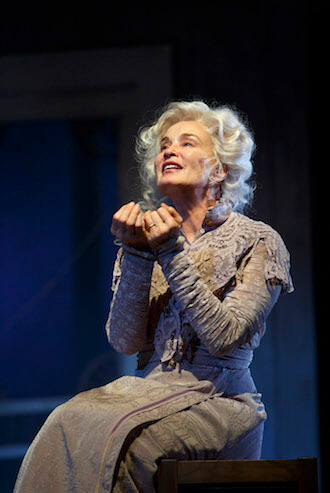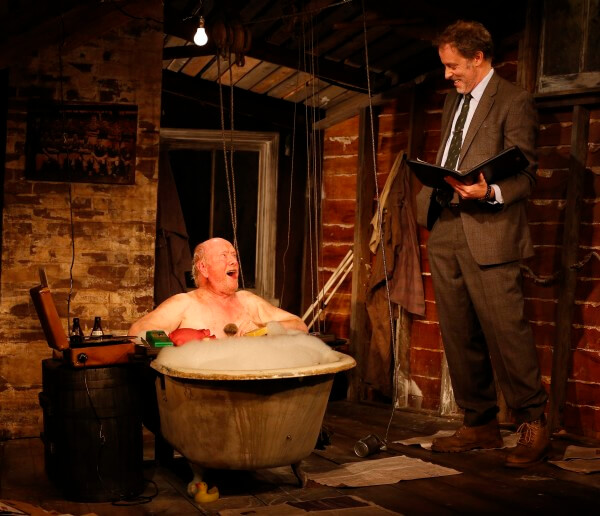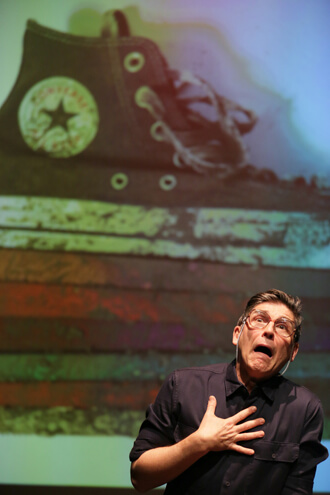Audra McDonald with Roxie and Shelton Becton in “Lady Day at Emerson’s Bar & Grill.” | EVGENIA ELISEEVA
It’s a foregone conclusion that, in the theater today, when you need an animal onstage — any animal — you go to the Master, Bill Berloni, whose way with performing beasts uncannily combines total sensitivity to their needs and utter onstage reliability.
I’m proud to say that I knew Berloni before his uniquely illustrious career began — when we were both first-year acting students at NYU, under the tutelage of the redoubtable Stella Adler. How well I recall how we’d sit, nervously awaiting her grand diva entrance, impeccably coiffed and groomed, inevitably wearing tailored slacks, pearls, and a brightly hued silk collarless blouse, and how she’d sit on her rattan throne and proceed to scare the living daylights out of us, while imparting certain life lessons I carry with me to this day.
I should have known then that I was meant much more for a seat in the orchestra than onstage, unlike our classmates Bill Paxton, Mia Dillon, and Rick Skye, currently doing one helluva Liza Minnelli impersonation at Don’t Tell Mama.
And Berloni, as well, chose another path, but one he virtually invented.
The whisperer of the Great White Way
“My parents couldn’t afford to send me to acting school,” he told me, “so my first two years I went to community college in Connecticut to save money and then I picked NYU, and Stella. Goodspeed Theater was putting on the original version of ‘Annie,’ and the dog trainers they called were too expensive to work on the Sandy that was in the script. So they went to the carpenters and prop people on staff and everybody threatened to quit if they had to find and train a dog, as well. So they needed a sucker and somehow my name came up.
“I got called to the producer’s office and was offered my Equity card in exchange for finding and training a dog. I’d had a small part in one show there so I thought it was the beginning of my professional acting career. I had no skills and no budget so I went to the pound and found this dog for seven dollars and trained him as I did my own growing up.
“That ‘Annie’ got terrible reviews, and I moved to New York to a walkup apartment on Sixth Avenue and Bleecker, with three roommates. It was on the sixth floor of a building that didn’t take dogs. I had fallen in love with Sandy so I moved him in, too, and would walk him on the roof so I didn’t have to walk him past the super’s apartment going out.
“After my first semester, Mike Nichols’ office called and said they were doing ‘Annie’ for Broadway and would I be interested. I thought I could make some money for my tuition and never knew it would become the ride that it did. So I left Stella to do ‘Annie’ and I never had the time afterwards to go back until the 1980s when I got my theater degree from the University of Connecticut.”
Berloni cites all this as just one of the many wonderful coincidences in his life: “When I was born, my mother had had some difficulty and, coming from a big Italian family, wasn’t exactly thrilled. When I was two, my parents asked me if I wanted a brother or sister and I said a dog. She ran out and bought me a collie and, as a result, I was an only child. We lived on a farm so I had a dog, a cat, and a rabbit in rural Connecticut. I didn’t see kids, so growing up until kindergarten, I must have found out ways to play with my pets or I’d be very lonely, which I wasn’t at all. When I went to school, I was very socially retarded and shy, being raised with animals as my friends.
“If you force an animal to do something, that repels them, so in order to not be lonely I must have figured out games to play that they liked. There’s a certain skill in understanding what animals like and delivering it to them so they do what you want and that’s what I must have learned and brought forward with me. Animals don’t act, they don’t have that intelligence. They’re real onstage all the time, which forces people around them to be real all the time, you have to be engaged. I was able to explain that to actors and personally it creates a different kind of performance than any other, which is why they’re so popular.
“Sandy was such a fluke and did the entire Broadway run, lived to be 16 and passed away when I was about 34, so he’d been with me half my adult life, through a marriage and a divorce, an important part of my life. ‘Annie’ was so popular that there were four national companies with 10 dogs. I was acting like a trainer, faking it, thinking nobody would figure it out, while taking tap with Peter Gennaro and singing.
“Then I got a call to do the revival of ‘Camelot’ with Richard Burton directed by Alan Jay Lerner — and I thought any way to be in that room, sure I will train the dog. That tour came to Broadway and then I was hired for the Eva Le Gallienne-directed ‘Alice in Wonderland’ with Kate Burton, so I was working with legends!
“But, by the end of ‘Annie’s’ first year run, I looked around at other 20-year-olds working then and I wasn’t as good-looking or talented and not a character actor. I realized I was doing pretty good training animals and made the decision to do it full time.”
It’s a field that Berloni has actually pretty much invented.
“No one else was doing this, except for another group providing animals, unsuccessfully. You can’t force a creature to do anything against their will. It’s gonna look like a mistake. How do you make it play so they don’t run away? My training uses a positive reinforcement method, and even today I don’t really have any competition because people are still doing the old ways, intimidation and control as opposed to cooperation.”
Animal rights is a constant crusade with Berloni: “Despite having an African-American president, same-sex marriage, more environmental concern, animals are still in that subclass of things we eat and push around and exploit. When I look for people to work with me, I want them to be like I was, with no training skills, just a love for animals. If they’ve worked with [dog whisperer] Cesar Millan, I just have to undo what they’ve learned so it’s easier to start fresh.”
Berloni has an amazing animal compound in Connecticut with quite a history.
“In the mid-1980s, I got disillusioned with the whole thing because to this day there are no laws protecting animals in entertainment. None of the unions will take us, so we get the lowest pay and worst conditions. I was walking off shows because they wouldn’t do the things expected for the animals, so I went back to Connecticut and bought a pretty house on three acres for $80,000. I went back to school but then Broadway called me back, but I continue to be an educator and animal advocate and only use rescue dogs. People ask me why and I say, ‘Because they’ll die otherwise.’
“I’ve trained cats, pigs, birds, and sheep, but, around this isolated property in the woods, people started building houses and 15 barking dogs created problems. So we found a barn for sale for $200,000 on 90 acres with some wetlands and now have horses, llamas, and chickens, as well.”
Don’t fool yourself, however, into thinking Bill Berloni, Broadway King of Animals, is getting rich.
“It’s not cheap. I have just one person working for me Monday through Friday. Boarding and feeding them is expensive and they are always getting sick. We never fly our animals to locations or theaters, but have vans to send them out regionally. If I were different, I wouldn’t care if they were shipped. Film and TV are both 10 times worse than theater in terms of not caring about the animals. They are considered props and, as such I have to report to the prop master.
“This producer of the film ‘Charlie Wilson’s War’ called me and said that [its director] Mike Nichols was only interested in using me to train the dogs. ‘Bill,’ she said, ‘we don’t have a big budget.’ But we came out to LA first class and they treated us so well. When Mike Nichols saw me on the set he gave me a big hug and I could see everybody wondering who I was.
“‘I gotta go back to work,’ he said. And then I get a call that he wants to see me and it’s Mike, screenwriter Aaron Sorkin, and the director of photography. Mike said, ‘Julia [Roberts] is going to be on the bed and Tom [Hanks] is in the bathroom, where do we put the dogs?’ And we started doing what we do in the theater, which is to direct the scene. We would get the shots on the first take and the producer was like, ‘We saved $50,000!’ Because I train dogs to get it right the first time.”
Berloni is now working on the film remake of “Annie.”
“It’s an African- American version. Jamie Foxx is Daddy Warbucks and Cameron Diaz is Miss Hannigan for a very smart director/ writer Will Gluck. There’s that Jay Z remix of ‘Hard Knock Life,’ and they’ve retained six songs from the show and written four or five new ones. I’m a kind of theater snob but it really is smart, they’ve changed the period to 2014. Warbucks is a cellphone billionaire from the ‘hood instead of a war tycoon, and Hannigan is a lounge singer who takes foster kids up to Harlem. I have high hopes for it.”
Bill Berloni with Romeo on opening night of “Threepenny Opera.” | HELENE DAVIS PR
This past theater season was particularly busy for Berloni, as he provided dogs for “Bullets Over Broadway,” “The Open House,” and most memorably, to me, Martha Clarke’s superb “Threepenny Opera.”
“I’d worked with her on two other dance epics. She’s brilliant and crazy. She loved this musical, wanted to make it accessible, and is still upset over the reviews and will probably never come back and direct. She took all her images from Weimar artwork, like this street scene of a murdered prostitute and a stray dog licking her blood. We had this rescue bulldog from ‘Legally Blonde’ and, for the scene in which Queen Victoria appears, the Atlantic Theater budget wouldn’t allow for two actors to portray her wearing a huge papier-mâché head, so Martha looked at Romeo and said, ‘I’m gonna make him the Queen!’”
The dog was brilliant, completely resembling that crusty monarch in crown and ermine cape, looking disdainfully at the audience as he was wheeled about the stage.
The Chihuahua that helped Audra McDonald to her record sixth Tony win in “Lady Day at Emerson’s Bar & Grill” is another of Berloni’s charges. McDonald is deeply attached to the animal, he told me, and once, when a blind person was seated on the orchestra aisle with her guide dog, there was some concern as to how this would distract the onstage furry actor. McDonald was asked if it was all right if she not have the dog during the latter portion of the show when she makes her entrance, but the star refused to go on without her. The patron was moved to a more discreet spot of the aisle — which is, um, evidently illegal — but Audra did go on, pup in arms.
Berloni has long yearned to see something like “Lassie: a Musical,” with one of his animals center stage and starring, not just providing comic relief.
“My wife Dorothy said, ‘Let’s produce our own,’ and she acquired the rights to ‘Because of Winn Dixie,’ Kate DiCamillo’s book which was made into a very mediocre film. It’s about a preacher with a young daughter whose wife runs away and they find this giant dog who brings the community together. We emptied out our savings account and went on a creative quest for collaborators. Duncan Sheik has written the score and Neil Benjamin of ‘Legally Blonde’ did the book and lyrics. We had our world premiere in Arkansas and sold out, the most successful show in that theater’s history, and the eventual plan, of course, is to bring it here.”
Berloni won a special Tony Award in 2011 for the invaluable service he’s provided for more than three decades now.
“That was really amazing. We were doing ‘Legally Blonde’ in 2007 and it closed in 2008 when the recession hit. Three Broadway shows then cut animals out. ‘Anything Goes’ cut the dogs, ‘Gypsy’ cut the live lamb but used a puppet [which was so fucking weird], and ‘The Miracle Worker’ cut Helen Keller’s seeing eye dog! Don’t call it a revival if you’re not putting onstage what the authors have written for a reason.
“I said that in an interview and got myself in trouble. It was a hard time. I hadn’t done a show in three years and my dad passed away. A little community theater in Red Bank, New Jersey, was doing ‘Annie’ and my trainers weren’t available. I buried my dad and drove to Red Bank to start rehearsals. I was in a hotel room, so sad, wondering where my life had gone, how I was going to pay my mortgage, and wondering if I’d ever do another show again. Suddenly, I got this phone call and it was the Tony committee telling me I had gotten this honorary award. I swear it was a sign from my father saying that it was gonna be okay.
Contact David Noh at Inthenoh@aol.com, follow him on Twitter @in_the_noh, and check out his blog at http://nohway.wordpress.com/.




































